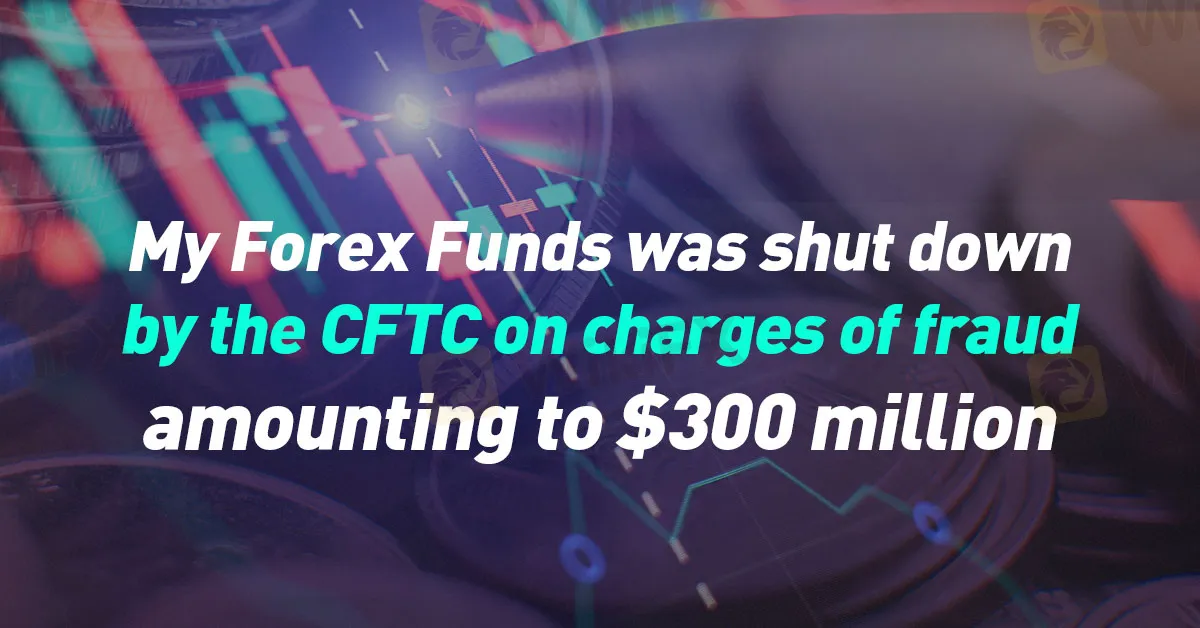简体中文
繁體中文
English
Pусский
日本語
ภาษาไทย
Tiếng Việt
Bahasa Indonesia
Español
हिन्दी
Filippiiniläinen
Français
Deutsch
Português
Türkçe
한국어
العربية
My Forex Funds was shut down by the CFTC on charges of fraud amounting to $300 million
Abstract:CFTC charges “My Forex Funds” with fraudulently taking over $300 million from customers hoping to become professional traders.

Case in Details
The Commodity Futures Trading Commission (CFTC) has taken a significant step in its ongoing fight against fraudulent activities within the financial markets. In a recent development, the CFTC has filed a complaint in the U.S. District Court for the District of New Jersey against Murtuza Kazmi, formerly based in Phillipsburg, New Jersey, and his business entities operating under the name “My Forex Funds.” The allegations in question center around deceptive practices used to solicit customers for leveraged retail forex and commodity transactions. In this article, we delve into the specifics of this case and its potential implications for the financial industry.
At the heart of this matter lies the CFTC's claim that “My Forex Funds” engaged in deceptive practices. The defendants made enticing promises to retail customers, offering them the chance to become “professional traders” by utilizing Traders Global's capital to engage in transactions with third-party “liquidity providers” and share in the resulting trading profits. These promises, such as “your success is our business,” were designed to create a sense of trust and partnership.
However, the reality starkly contrasts with what was portrayed. According to the CFTC, Traders Global, in reality, acted as the counterparty to most customer trades, directly profiting from customer losses. The deception extended further with a series of tactics aimed at reducing the likelihood of customers achieving profitable trades. These tactics included terminating customer accounts under false pretexts, imposing misleading commissions, executing customer orders at unfavorable prices, and handicapping the few successful customers to amplify overall losses.
The scale of this alleged fraud is staggering. Since November 2021, more than 135,000 customers subscribed to the “My Forex Funds” trading program, contributing at least $310 million in fees. These substantial funds, rather than being invested for the promised benefit of customers, were allegedly misappropriated. The complaint alleges that Kazmi used the proceeds from this scheme to acquire luxury properties and vehicles and transferred tens of millions of dollars to his personal accounts.
The CFTC's Response
The CFTC has responded promptly and decisively to this fraudulent scheme. On August 29, U.S. District Court Judge Robert B. Kugler issued a statutory restraining order, freezing the defendants' assets and requiring them to submit books and records for examination by the CFTC. Additionally, a temporary receiver was appointed to oversee the situation. A hearing on the CFTC's motion for a preliminary injunction is scheduled for September 11, emphasizing the urgency of this case.
The CFTC is seeking various remedies to address the harm caused by this alleged fraud. These remedies encompass restitution for defrauded investors, disgorgement of ill-gotten gains, civil monetary penalties, permanent bans on trading and registration, and a permanent injunction against further violations of the Commodity Exchange Act (CEA).
This case has not remained confined to U.S. borders. In a parallel action, the Ontario Securities Commission issued a temporary cease-trade order on August 29. This order includes a prohibition against all trading in any securities by Traders Global Group Inc. and Murtuza Kazmi. The collaboration between international regulatory bodies, such as the Ontario Securities Commission, underscores the global nature of financial fraud and the necessity of collaborative efforts to effectively combat it.
Conclusion
The CFTC's pursuit of justice in the case against “My Forex Funds” and Murtuza Kazmi conveys a clear message to the financial industry: fraudulent practices will not be tolerated. The alleged deception, which resulted in significant financial losses for numerous retail investors, serves as a stark reminder of the critical importance of investor protection and regulatory oversight. As legal proceedings unfold, the industry observes closely, hopeful that such actions will act as a deterrent and reinforce the integrity of financial markets.

Disclaimer:
The views in this article only represent the author's personal views, and do not constitute investment advice on this platform. This platform does not guarantee the accuracy, completeness and timeliness of the information in the article, and will not be liable for any loss caused by the use of or reliance on the information in the article.
Read more

Tradu Joins TradingView for Seamless CFD and Forex Trading
Tradu, a global trading platform, integrates with TradingView for seamless CFD and forex trading, offering transparency, tight spreads, and fast execution.

Protect Your Portfolio in the Storm | What Are Safe Haven Assets?
Gold surged to an all-time high on Tuesday, driven by renewed weakness in the US dollar, ongoing trade war tensions, and critical remarks from President Donald Trump aimed at the Federal Reserve. These factors fuelled strong demand for safe-haven assets, pushing bullion above US$3,485 an ounce for the first time. But what exactly are safe haven assets? Why is everyone raving about them?

SEC Warns of Love Scams and Pig Butchering Investment Schemes
SEC's new campaign warns about relationship investment scams, highlighting red flags, losses, and protective measures. Stay safe from "pig butchering" schemes.

WeTrade Secures CySEC License to Expand EU Trading Services
WeTrade secures a CySEC license, allowing EU-wide operations. The approval boosts services, partnerships, and trust across the global trading community.
WikiFX Broker
Latest News
FCA Issues Alerts Against Unauthorised and Clone Firms in the UK
Consob Orders Blackout of 9 Fraudulent Financial Websites
eXch Exchange to Shut Down on May 1 Following Laundering Allegations
How a Viral TikTok Scam Cost a Retiree Over RM300,000
FCA Proposes Simplifying Investment Cost Disclosure for Retail Investors
JT Capital Markets Review
Fresh Look, Same Trust – INGOT Brokers Rebrands its Website
Tradu Joins TradingView for Seamless CFD and Forex Trading
Japan Issues Urgent Warning on $700M Unauthorized Trades
Beware of Gold Bar Investment Scams: Rising Threats
Currency Calculator


